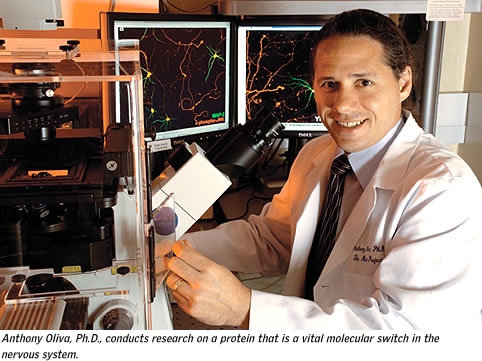
Anthony Oliva, Ph.D., an assistant scientist
in the laboratory of Vance Lemmon, Ph.D., at The Miami Project
to Cure Paralysis, has discovered a new role for what he
refers to as “junk.” In the world of biochemistry, when
he says “junk,” he is talking about c-Jun N-terminal
kinase (JNK), a protein in the nervous system that controls
complex processes in cells.
Researchers are learning that JNK plays many
different roles in the chemistry of the nervous system. In
some instances, JNK
is responsible for switching on cell death, while at other
times it may signal regeneration. Oliva and his colleagues,
including
his wife, Coleen Atkins, Ph.D., were the first to show that
when a neurite makes the commitment to become an axon, JNK
plays a
critical role in its formation.
For decades researchers have known the sequence
in which these structures develop. “If you do live cell imaging,” explains
Oliva, “the neurites grow and retract, grow and retract.
The neurites all have similar lengths until all of a sudden one
undergoes a prolonged growth spurt. That’s the one that
becomes the axon, and the others become the dendrites.” While
this physical growth process has been easily observed under the
microscope, the biochemical events that take place to control
the formation of axons are only beginning to be known.
To clarify JNK’s role in axon development, Oliva carried
out research that led him to conclude that JNK is definitely
an important molecular switch for axon growth. In cell culture
studies, when he blocked the activation of JNK, the developing
neuron did not form an axon—yet dendrites still appeared
to form normally. When he released the block to allow JNK to
be activated, an axon formed. This new discovery opens up the
possibility of developing new treatment strategies for neurological
disorders—ones that might flip an intrinsic switch in injured
adult nerve cells and restart axon development. |
|